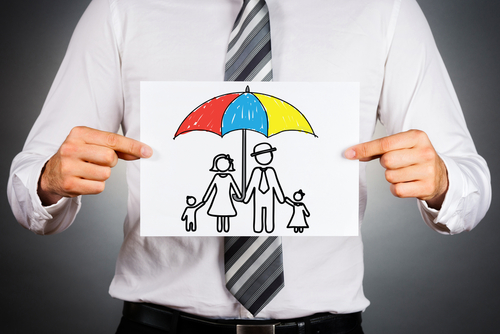 Home insurance is a policy that should meet all the needs associated with owning a property. A home insurance policy should protect you from damage to your property, such as theft, fire, and explosion, but also in the event of an emergency, such as damage from natural disasters, floods, and vandalism. What about life insurance?
Home insurance is a policy that should meet all the needs associated with owning a property. A home insurance policy should protect you from damage to your property, such as theft, fire, and explosion, but also in the event of an emergency, such as damage from natural disasters, floods, and vandalism. What about life insurance?
(the article continues)
 Life insurance is probably the most well-known, and it provides for the payment of the capital stipulated in the contract to one or more beneficiaries in the event of the insured's death. There are term and whole life life insurance policies: the former provide for the payment of a capital sum if the insured's death occurs while the policy is still in force, while the latter are paid after the policyholder's death, regardless of when it occurs. When and how does home and family insurance protect me?
Life insurance is probably the most well-known, and it provides for the payment of the capital stipulated in the contract to one or more beneficiaries in the event of the insured's death. There are term and whole life life insurance policies: the former provide for the payment of a capital sum if the insured's death occurs while the policy is still in force, while the latter are paid after the policyholder's death, regardless of when it occurs. When and how does home and family insurance protect me?
(the article continues)
 Here are some simple examples:
Here are some simple examples:
-
- Did your child break a neighbor's window with a ball? Protect your family from harm to neighbors or others.
- Has your home been burglarized? In the event of a theft or robbery, your insurance will reimburse you.
- Did a faulty washing machine flood your home? You don't have to worry about a thing. Your Home and Family insurance policy will ensure you get the right reimbursement.
- Does your house go up in flames? In the event of a fire, your home insurance will cover the reconstruction costs.
When and how does life insurance protect me?
(the article continues)
 Life insurance is an insurance policy that, in exchange for a premium, allows the insured to financially support their family even in the event of death, total and permanent disability, or loss of self-sufficiency, thus allowing them to maintain a normal lifestyle. The policy can be purchased on one's own life or that of a third party. The premium is usually paid monthly, although semi-annual or annual payments are also available. The cost of life insurance varies depending on numerous factors, including the rates charged by each company, the type of coverage chosen, and the risk of the insured event (death, disability, etc.) occurring. Before signing the contract, the insurance company provides the prospective client with a questionnaire to complete, which must include all the information needed to calculate the risk: the insured's usual occupation, lifestyle habits (for example, whether they smoke or engage in extreme sports), and information about their medical history (including any family history of hereditary diseases). A life insurance policyholder must promptly report any changes in profession or any other changes in lifestyle or health conditions, so that their insurance company can recalculate the risk and therefore the premium amount. False or incomplete declarations may jeopardize the right to compensation.
Life insurance is an insurance policy that, in exchange for a premium, allows the insured to financially support their family even in the event of death, total and permanent disability, or loss of self-sufficiency, thus allowing them to maintain a normal lifestyle. The policy can be purchased on one's own life or that of a third party. The premium is usually paid monthly, although semi-annual or annual payments are also available. The cost of life insurance varies depending on numerous factors, including the rates charged by each company, the type of coverage chosen, and the risk of the insured event (death, disability, etc.) occurring. Before signing the contract, the insurance company provides the prospective client with a questionnaire to complete, which must include all the information needed to calculate the risk: the insured's usual occupation, lifestyle habits (for example, whether they smoke or engage in extreme sports), and information about their medical history (including any family history of hereditary diseases). A life insurance policyholder must promptly report any changes in profession or any other changes in lifestyle or health conditions, so that their insurance company can recalculate the risk and therefore the premium amount. False or incomplete declarations may jeopardize the right to compensation.
(the article continues)
 Life insurance policies vary based on the type of coverage : life, death, or disability. The most common are:
Life insurance policies vary based on the type of coverage : life, death, or disability. The most common are:
-
- Life insurance : This is the most common life insurance policy: in the event of the insured's premature death, his or her family beneficiaries receive a pre-established cash capital or an annuity (depending on the terms of the contract) from the insurance company.
- Life insurance : A life insurance policy is a savings tool to ensure a peaceful retirement: it consists of investing in an accumulation plan in order to consolidate savings and be able to access them at a pre-established maturity.
- Mixed life insurance policies : Mixed life insurance policies are the most comprehensive, as they protect against both types of events covered by life and death insurance policies—that is, both the premature death of the insured and the event of longevity. But that's not all: they can also cover other types of events, such as disability, job loss, accidents, or illnesses.
- Home loan insurance : This is a very important policy that guarantees the repayment of the mortgage in the event of the policyholder's death or other event such as job loss or disability.
- Unit-linked and index-linked life insurance policies : These are mixed insurance-financial instruments: through this type of policy the policyholder invests in funds for a duration equal to his or her lifetime.
You may also like
The High Rent Dilemma for Italian Students: Challenges and Solutions
The issue of high rent prices in Italy presents a daunting challenge for university students, limiting their access to suitable living accommodations. This article explores the multifaceted causes of this problem, examines its impacts on students, and proposes a variety of solutions to alleviate the financial burden on students, including governmental initiatives, university housing projects, and community-based approaches.
Decorating Your Home Without Waste: Practical Tips for the Living Room and Bedroom
Decorating your home can be an expensive undertaking, but with the right tools, you can create welcoming and functional spaces without breaking the bank. In this article, we explore practical tips for decorating your living room and bedroom while saving money, with an eye on design and quality.
The Best Sun Loungers of 2025
Exploring the most popular sun loungers of 2025, this article delves into the technical features, pros and cons, pricing, and innovative highlights, providing a detailed comparison to help consumers make an informed decision.
Air Fryers: A Kitchen Revolution or Just a Passing Fad?
Air fryers are gaining popularity as a healthy and versatile cooking tool. But do they really live up to expectations or simply a passing fad? This article explores the technology, benefits, limitations, and expert opinions on these appliances.
